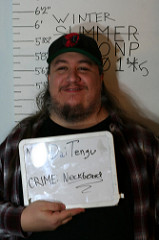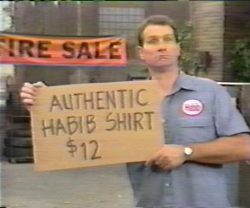In recent years, the term “neckbeard” has become perjorative short-hand for “undesirable dude.” Not just undesirable in the sexual sense, but in the social as well. When Ricochet’s Jon Gabriel tweeted about seeing a bunch of neckbeards at a comic book shop, it was pretty much assumed what he meant. Male losers. It relates, directly or indirectly, to ungroomed hair growth in the neck area. We can infer from that that this is not someone who takes care of their appearance.
Why the neckbeard? Mostly the process of elimination. Things like traditional stubble, messy hair, and so on have become intentional adornments. Other things, such as obesity or general ugliness, it’s considered untoward to comment on. A neckbeard, though? That’s a deliberate choice. Losing weight is hard, and most of us know at least someone that has struggled with it. But shaving your neck isn’t. If you can’t even do that, then you obviously don’t care about your appearance and contempt cast your way is therefore to some degree earned. So we can, with that one combined word, describe someone’s attitude towards their own appearance. Very handy.
I’ve hated neckbeards since before hating neckbeards was cool. I have a very fertile neck, as far as that goes, and I therefore shave it at every opportunity. Regular stubble can be an affectation, but neck hair almost never looks good (and especially not on someone like me that has a thick neck even when I’m thin).
Sometimes, though, a neckbeard isn’t really a neckbeard. Sometimes it’s okay. Sometimes it goes completely unnoticed. When does it go unnoticed? When it’s on this guy.
Thats Stephen Amell, who plays Oliver Queen, the title character on the TV show Arrow. He doesnt shave his neck, but people dont seem to especially notice. Ive had the conversation on more than one occasion. A friend commented how much she likes Oliver Queens beard. I ask whether she means the Van Dyke from the comic or the neckbeard from the TV show. Confusion follows because what neckbeard?
Now, granted, Amell doesnt have a full neckbeard. But like me he has a fertile neck, and in any given scene the hair on his neck will match the hair on his face, and neither are usually clean. He does the stubble thing, which is hip. He also does the neckbeard thing, which really only works because he looks like Stephen Amell. I suspect that, on the face of a perhaps chubby comic book nerd, thats what Gabriel was looking at in the comic book shop. In short, if you look like that fellow on the left, you can’t pull it off. If you look like the fellow to the right, you can:


One of the reasons that Taidengu is more likely to be criticized than Amell is because it’s more noticeable on account of their respective frames. The smaller your neck, the less noticeable it genuinely is. Which is the case for a lot of things. Though Elizabeth Piccuito informs me that this is no longer the case it once was, thanks to capitalism, it seems that fashion trends for women are geared very heavily towards those that have the best figures. Which is to say trends seem to go specifically towards those outfits that compliment the fewest number of frames. While that’s commercial and this is physical, it is nonetheless a noticeable truth that if you look good in a traditional way you can get away with a lot more than if you’re on the fringe.
This came to mind a day later with Nob Akimoto commented that being able to dress down is a form of privilege. It was, I believe, in reference to Bernie Sanders and the White House Correspondence Dinner. I believe that’s actually quite right, and for a lot of the same reasons that Stephen Amell doesn’t need to worry about shaving the way us mere mortals do.
Amell can afford people criticizing his neck – if they even notice – because he is so otherwise good looking. Someone like Bernie Sanders can get away with acting low-class because he is a very important person. It’s just an affectation! It’s just Bernie being a man of the people! Which is all fine and good, but these are only assumptions we make because we know that he could wear a tux and doesn’t. Someone else who doesn’t wear a tux we might make other, less populist, assumptions about.
Sheila Tone made a similar observation about being able to dress her oldest child (then her only child) in ragmuffin attire. She said it years ago, on a site that has since been taken down, but it’s stuck with me all of this time. I can dress Lain however I want. I can get clothes from goodwill. If she is so inclined, I can let her go out in her underwear. No one will make assumptions about us. No one will call the CPS worried that we can’t afford decent clothes. People might look at her and determine that we are bad parents, I guess, but not in any threatening way. We can chalk it up to eccentricity.
So what does all of this mean? Is Stephen Amell required to shave like us mere mortals? Does Bernie Sanders have to wear a tux? Or do we stop criticizing everyone else? Is that desirable or even possible while trying to maintain cultural standards? Are cultural standards themselves the enemy? Is it desirable or possible to live without them?
 When I was young and single, I was a sucker for work shirts. You know, Habib shirts, like from on Married With Children. I never found a true Habib shirt, sadly, but I had several with a lot of names, some Anglo and some not. You could get three for five dollars. For a college kid on a limited budget, that was really cool. They were certainly cooler than “1992 Charity Fun Run” shirts for the same price. I can lean on my comparatively limited funds and being truly frugal at the time. I would feel extremely self-conscious wearing them now, though, and not without reason.
When I was young and single, I was a sucker for work shirts. You know, Habib shirts, like from on Married With Children. I never found a true Habib shirt, sadly, but I had several with a lot of names, some Anglo and some not. You could get three for five dollars. For a college kid on a limited budget, that was really cool. They were certainly cooler than “1992 Charity Fun Run” shirts for the same price. I can lean on my comparatively limited funds and being truly frugal at the time. I would feel extremely self-conscious wearing them now, though, and not without reason.
There are no broad answers, of course. It goes to the question of the value of social norms, for which everyone has a different answer both broadly and in individual instances as well. When Bernie refuses to wear the tux, is he running interference for those that can’t or is he inadvertently mocking them for a judgment from which he is comparatively immune? Is Stephen Amell being “normal” with his lazy shaving habits, or is he doing with his face what an attractive woman might do with a particular bathing suit: Only I can pull this off. What is the intention, and what is the reception? To what extent do they even think about it? To what extent is it their responsibility? And to what extent is all of this just urinating into the tornado of the inequities of life and society?
Taidengu Photo by Thaadd 
Stephen Amell Photo by Gage Skidmore 
About the Author
14 Responses to The Privilege of Slumming It
Leave a Reply
please enter your email address on this page.


Does stubble ever count as a neckbeard? I wouldn’t call face stubble a regular beard, either.
Also, the placard says Dai Tengu. Should I know who that is?
Not that I’m questioning your broader point, but i suspect that the fact that it’s just stubble is doing a lot of the heavy lifting here. Not all, but more than is ideal.
The principle complaint against “Neckbeards” is, as I understand it, that it is indicative of a lack of grooming. Not a matter of taste, but an inadvertent thing that people who don’t take care of their appearance often do. Which applies as well (or more, really) to stubble and uneven neck hair, as it does a consciously grown facial hair.
Huh. I always interpreted “neckbeard” as code for a set of behaviors, rather than being specific to the guy’s appearance. In my definition, “neckbeard” is that guy who makes exaggerated show of what looks like chivalry (the stereotypical, “M’lady” bit) but is honestly kind of a jerk, both to women and other people. Also someone who is a know-it-all about a narrow area of knowledge (Dr. Who, physics, 1970s baseball) and doesn’t tolerate that anyone might know more about the topic than them, especially on the internet. Often it’s a person with a strong inferiority complex, which is why they treat other people the way they do.
I guess I never really noticed the question of stubble on the neck, but I work with a lot of bearded men whose beards range from the carefully maintained and shaped to almost-full-on ZZ Top.
Not sure what the female equivalent of “neckbeard” would be. “Cat lady” doesn’t quite fit.
Because the term “neckbeard” is applicable only to males, one can use it without incurring feminist wrath.
“Cat lady” has semi-geriatric connotations not applicable to “neckbeard.”
Legbeard.
Deliberately unshaved legs on a woman are mainly a hippie/nonconformist thing. Quite unlike neckbeards.
Not necessarily. Outside of America (especially in Asia), I think its more common (or it used to be more common) for women to not shave their legs. Hollywood is changing things
You’re focused on the wrong part of the word, it isn’t the beard, but the neck, or more specifically the lack of chin, that drives the stereotype. Arnell has a chin you can rappel off of, while the stereotypical neckwear is more of a sledding hill.
Its this, but also the fact that some people, consciously or otherwise grow more hair around their necks than on their upper lips or chin. So, Arnell is not wearing a neckbeard proper, his beard covers his jaw-line with the density as it does his upper neck area. A proper neckbeard is when the hair grows more densely from the neck region without crossing into the jawline. Some people’s facial hair naturally grows this way. Some people have so much fat on their necks that you can’t see their jaw line. And lots of the neckbeard pictures that pop up on google seem to be groomed in that way (he shaves everywhere but the neck)
Nah, it’s the fact that he looks like Steven Amell.
I know a guy with a chin you can bruise yourself on but who doesn’t otherwise look like a TV star. His neckbeard is still an obvious neckbeard in teh way Amell’s isn’t.
That said, after having this pointed out to me, I’m not sure I can look at Steven Amell without dwelling way to much on his suddenly unattractive facial hair.
I’m sorry if I ruined Amell for you…
Kind of on a tangent, but one of the big perks of my job is that I can dress pretty casually. Not just the sleek “business casual” that some places tolerate, but something approaching “sloppy casual.”
It’s not an absolute perk. Sometimes I do have to dress up. And there is certainly some degree of sloppiness that would be inappropriate. But it’s cool to be able to wear (what is for me) everyday and comfortable clothes.
I don’t think I buy the Sanders part of this. I mean, is he more privileged than everyone else who goes to the WHCD, but does so in the tux? That doesn’t make any sense.
I’m pretty sure anyone who can go the WHCD is also privileged enough to do so not in the tux if that’s what they want to do.
Sanders’ WHCD attire simply reflects his (political) signaling desires, not a unique level of privilege that allows him to express them. The privilege is (or is reflected by ) the invitation, and I imagine by the proximity of one’s seat to the president, or something like that.